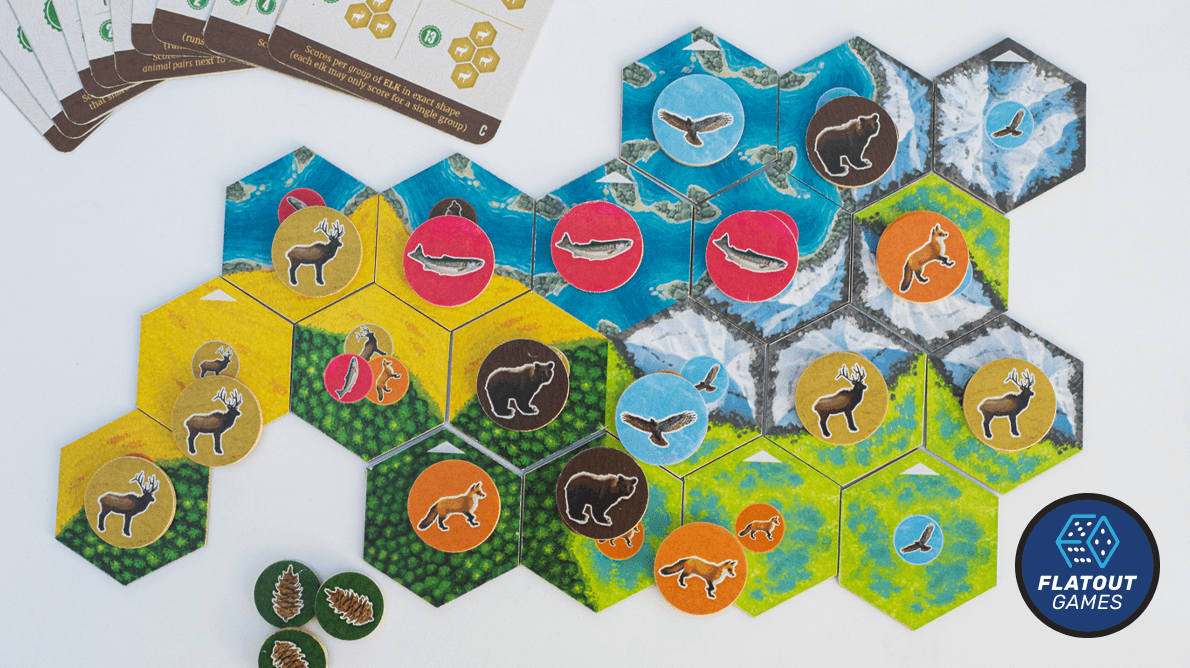22 October 2021
|
How the Pacific Northwest was won
Sometimes our greatest pleasures are our simplest pleasures. This is why tile-placement continues to be such a popular genre. In most cases, your turn will comprise little more than selecting a tile (either from a shared group or your own hand) and laying it down on the table, ideally arranging it in such a way that it both earns you the most points and forms the most pleasing visual tableau. Cascadia combines that simple pleasure with another: nature and the great outdoors. Assisted by Beth Sobel’s gorgeous artwork, it requires its players to build a Pacific North-Western environment which, in a Wingspan-ish style, should provide the best habitats for its faunal populace.
This requires a minor complication. You must not only choose a habitat hex tile from four on display at the centre of the table; you must also take an attached wildlife token. These are drawn blindly from a cloth bag and paired randomly with the habitat tiles on offer, though once taken they can be placed down separately in your own environment.
Each habitat tile grants access to one, two or three specific animals, but you can only ever place one animal per tile, so your choices can be limited. Especially as you need to arrange all your wildlife in point-harvesting patterns, which are determined by a variety of wildlife scoring cards. (These can be shuffled up and put out randomly, or you can keep them in their assigned sets.) For example, grizzly bears might need to be placed in mating pairs, with no other bears adjacent; Roosevelt elk, meanwhile, should be arranged in straight lines, up to four elk long. Oh, and you also earn points for connecting matching habitats, be they forests, mountains, wetlands, rivers or prairies.
It makes for an exquisitely enjoyable puzzle experience which, lacking a shared tableau, trades player interaction for personal absorption; very similar to Calico, although a bit less of a mind-frazzler if you stick with the simpler scoring cards. Designer Randy Flynn (making his debut with this game) also kindly includes a frustration-mitigation mechanism in the form of nature tokens. These can be won by placing a special keystone tile and covering it with the appropriate wildlife token. Each nature token allows you to take any habitat-and-wildlife combination you like from those on offer (rather than the usually enforced random pairing), or alternatively wipe and replace any number of wildlife tokens. In combination with an 'overpopulation' mechanism (which allows a player to replace three of the same wildlife with three random replacements) this gives you some welcome flexibility that doesn’t feel unearned. Plus, any nature tokens that haven’t been used award bonus points at the end.
Cascadia is a lovely little game, which could welcome many newcomers to the hobby – like its venerable progenitor Carcassonne. It does suffer some slowdown with higher player counts, however, and you may become impatient for your next turn as you wait for everyone else to make their minds up about what to do. But, on the flip side, it does also scale down smoothly to a decent solo experience.
DAN JOLIN
PLAY IT? YES ![]()
A peaceful, puzzley experience whose simple rules and minimal set-up fuss make it an ideal way to introduce people to the joys of Eurogaming, while still providing enough of a challenge to please tabletop veterans.
Swap cats for wildlife and quilts for the Great Outdoors, and you’re pretty much there – though Cascadia is a little easier on the brain and therefore a tad more chilled.
Designer: Randy Flynn
Publisher: AEG
Time: 30-45 minutes
Players: 1-4
Ages: 10+
Price: £40
What’s in the box?
- 85 Habitat tiles
- 100 Wildlife tokens
- 25 Nature tokens
- 5 Starter habitat tiles
- 21 Wildlife scoring cards
- 1 Cloth bag
- 1 Scorepad
This article originally appeared in issue 60 of Tabletop Gaming. Pick up the latest issue of the UK's fastest-growing gaming magazine in print or digital here or subscribe to make sure you never miss another issue.
Sometimes we may include links to online retailers, from which we might receive a commission if you make a purchase. Affiliate links do not influence editorial coverage and will only be used when covering relevant products









Comments
Login or register to add a comment
No comments